كون الانسان شاب قد لا تعني الكثير شاهدت كبار بالسن اكثر تسامح من كثير من الشباب اكثر مؤثر في شخصية الانسان هي البيئة
تمعن بالاحمر
RIYADH, Saudi Arabia — I never thought I’d live long enough to write this sentence: The most significant reform process underway anywhere in the Middle East today is in Saudi Arabia. Yes, you read that right. Though I came here at the start of Saudi winter, I found the country going through its own Arab Spring, Saudi style.
Unlike the other Arab Springs — all of which emerged bottom up and failed miserably, except in Tunisia — this one is led from the top down by the country’s 32-year-old crown prince, Mohammed bin Salman, and, if it succeeds, it will not only change the character of Saudi Arabia but the tone and tenor of Islam across the globe. Only a fool would predict its success — but only a fool would not root for it.
To better understand it I flew to Riyadh to interview the crown prince, known as “M.B.S.,” who had not spoken about the extraordinary events here of early November, when his government arrested scores of Saudi princes and businessmen on charges of corruption and threw them into a makeshift gilded jail — the Riyadh Ritz-Carlton — until they agreed to surrender their ill-gotten gains. You don’t see that every day.
We met at night at his family’s ornate adobe-walled palace in Ouja, north of Riyadh. M.B.S. spoke in English, while his brother, Prince Khalid, the new Saudi ambassador to the U.S., and several senior ministers shared different lamb dishes and spiced the conversation. After nearly four hours together, I surrendered at 1:15 a.m. to M.B.S.’s youth, pointing out that I was exactly twice his age. It’s been a long, long time, though, since any Arab leader wore me out with a fire hose of new ideas about transforming his country.
We started with the obvious question: What’s happening at the Ritz? And was this his power play to eliminate his family and private sector rivals before his ailing father, King Salman, turns the keys of the kingdom over to him?
Photo
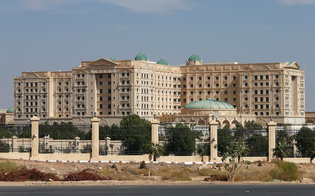
The Ritz-Carlton Hotel in Riyadh.CreditFaisal Al Nasser/Reuters
It’s “ludicrous,” he said, to suggest that this anticorruption campaign was a power grab. He pointed out that many prominent members of the Ritz crowd had already publicly pledged allegiance to him and his reforms, and that “a majority of the royal family” is already behind him. This is what happened, he said: “Our country has suffered a lot from corruption from the 1980s until today. The calculation of our experts is that roughly 10 percent of all government spending was siphoned off by corruption each year, from the top levels to the bottom. Over the years the government launched more than one ‘war on corruption’ and they all failed. Why? Because they all started from the bottom up.”
ليس لديك تصريح لمشاهدة الرابط، فضلا قم ب تسجيل الدخول او تسجيل
So when his father, who has never been tainted by corruption charges during his nearly five decades as governor of Riyadh, ascended to the throne in 2015 (at a time of falling oil prices), he vowed to put a stop to it all, M.B.S. said:
“My father saw that there is no way we can stay in the G-20 and grow with this level of corruption. In early 2015, one of his first orders to his team was to collect all the information about corruption — at the top. This team worked for two years until they collected the most accurate information, and then they came up with about 200 names.”
Photo
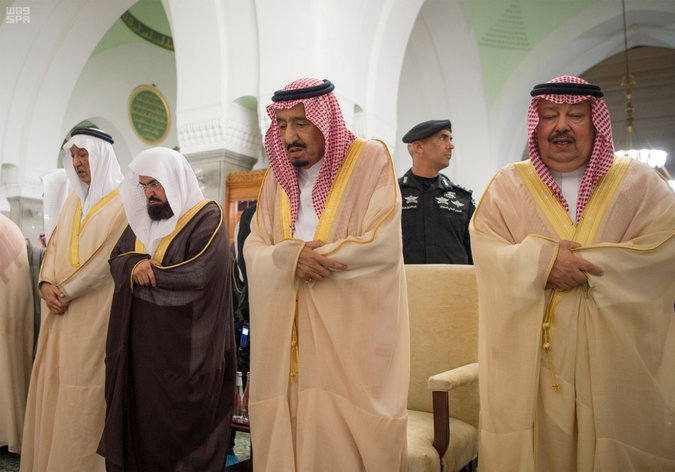
King Salman praying at Quba mosque in Medina, Saudi Arabia, this month. CreditReuters
When all the data was ready, the public prosecutor, Saud al-Mojib, took action, M.B.S. said, explaining that each suspected billionaire or prince was arrested and given two choices: “We show them all the files that we have and as soon as they see those about 95 percent agree to a settlement,” which means signing over cash or shares of their business to the Saudi state treasury.
“About 1 percent,” he added, “are able to prove they are clean and their case is dropped right there. About 4 percent say they are not corrupt and with their lawyers want to go to court. Under Saudi law, the public prosecutor is independent. We cannot interfere with his job — the king can dismiss him, but he is driving the process … We have experts making sure no businesses are bankrupted in the process” — to avoid causing unemployment.
“How much money are they recovering?” I asked.
The public prosecutor says it could eventually “be around $100 billion in settlements,” said M.B.S.
There is no way, he added, to root out all corruption from top to the bottom, “So you have to send a signal, and the signal going forward now is, ‘You will not escape.’ And we are already seeing the impact,” like people writing on social media, “I called my middle man and he doesn’t answer.” Saudi business people who paid bribes to get services done by bureaucrats are not being prosecuted, explained M.B.S. “It’s those who shook the money out of the government” — by overcharging and getting kickbacks.
The stakes are high for M.B.S. in this anticorruption drive. If the public feels that he is truly purging corruption that was sapping the system and doing so in a way that is transparent and makes clear to future Saudi and foreign investors that the rule of law will prevail, it will really instill a lot of new confidence in the system. But if the process ends up feeling arbitrary, bullying and opaque, aimed more at aggregating power for power’s sake and unchecked by any rule of law, it will end up instilling fear that will unnerve Saudi and foreign investors in ways the country can’t afford.
But one thing I know for sure: Not a single Saudi I spoke to here over three days expressed anything other than effusive support for this anticorruption drive. The Saudi silent majority is clearly fed up with the injustice of so many princes and billionaires ripping off their country. While foreigners, like me, were inquiring about the legal framework for this operation, the mood among Saudis I spoke with was: “Just turn them all upside down, shake the money out of their pockets and don’t stop shaking them until it’s all out!”
Photo
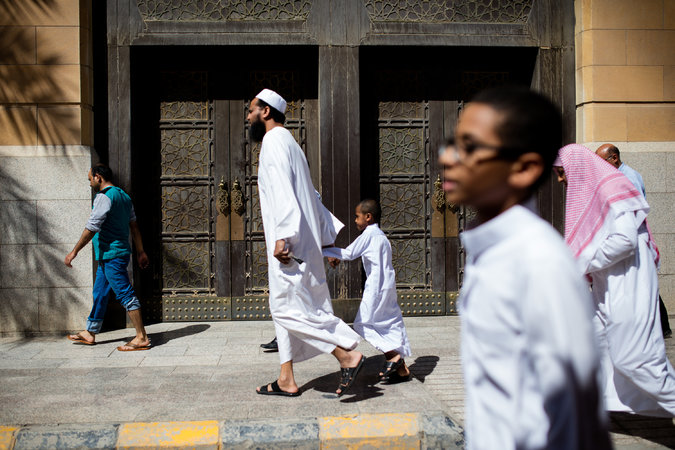
Men entering Alrajhi Mosque for noon prayer last month. CreditTasneem Alsultan for The New York Times
But guess what? This anticorruption drive is only the second-most unusual and important initiative launched by M.B.S. The first is to bring Saudi Islam back to its more open and modern orientation — whence it diverted in 1979. That is, back to what M.B.S. described to a recent global investment conference here as a “moderate, balanced Islam that is open to the world and to all religions and all traditions and peoples.”
I know that year well. I started my career as a reporter in the Middle East in Beirut in 1979, and so much of the region that I have covered since was shaped by the three big events of that year: the takeover of the Grand Mosque in Mecca by Saudi puritanical extremists — who denounced the Saudi ruling family as corrupt, impious sellouts to Western values; the Iranian Islamic revolution; and the Soviet invasion of Afghanistan.
These three events together freaked out the Saudi ruling family at the time, and prompted it to try to shore up its legitimacy by allowing its Wahhabi clerics to impose a much more austere Islam on the society and by launching a worldwide competition with Iran’s ayatollahs over who could export more fundamentalist Islam. It didn’t help that the U.S. tried to leverage this trend by using Islamist fighters against Russia in Afghanistan. In all, it pushed Islam globally way to the right and helped nurture 9/11.
A lawyer by training, who rose up in his family’s education-social welfare foundation, M.B.S. is on a mission to bring Saudi Islam back to the center. He has not only curbed the authority of the once feared Saudi religious police to berate a woman for not covering every inch of her skin, he has also let women drive. And unlike any Saudi leader before him, he has taken the hard-liners on ideologically. As one U.S.-educated 28-year-old Saudi woman told me: M.B.S. “uses a different language. He says, ‘We are going to destroy extremism.’ He’s not sugar-coating. That is reassuring to me that the change is real.”
Indeed, M.B.S. instructed me: “Do not write that we are ‘reinterpreting’ Islam — we are ‘restoring’ Islam to its origins — and our biggest tools are the Prophet’s practices and [daily life in] Saudi Arabia before 1979.” At the time of the Prophet Muhammad, he argued, there were musical theaters, there was mixing between men and women, there was respect for Christians and Jews in Arabia. “The first commercial judge in Medina was a woman!” So if the Prophet embraced all of this, M.B.S. asked, “Do you mean the Prophet was not a Muslim?”
Then one of his ministers got out his cellphone and shared with me pictures and YouTube videos of Saudi Arabia in the 1950s — women without heads covered, wearing skirts and walking with men in public, as well as concerts and cinemas. It was still a traditional and modest place, but not one where fun had been outlawed, which is what happened after 1979.
If this virus of an antipluralistic, misogynistic Islam that came out of Saudi Arabia in 1979 can be reversed by Saudi Arabia, it would drive moderation across the Muslim world and surely be welcomed here where 65 percent of the population is under 30.
One middle-age Saudi banker said to me: “My generation was held hostage by 1979. I know now that my kids will not be hostages.” Added a 28-year-old Saudi woman social entrepreneur: “Ten years ago when we talked about music in Riyadh it meant buying a CD — now it is about the concert next month and what ticket are you buying and which of your friends will go with you.”
Photo
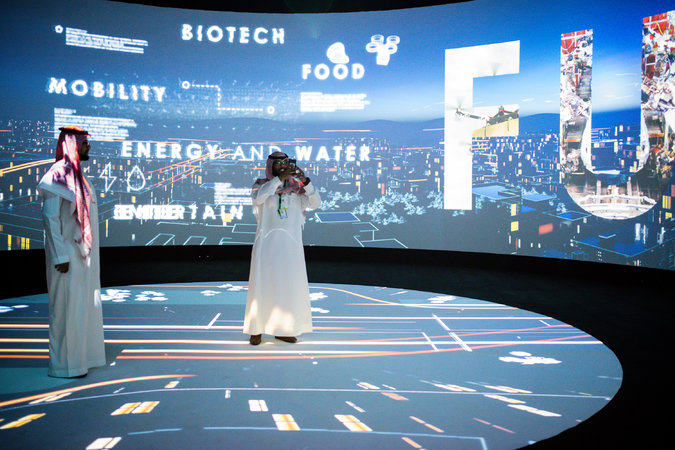
Participants at the Future Investment Initiative conference in Riyadh, in October.CreditTasneem Alsultan for The New York Times
Saudi Arabia would have a very long way to go before it approached anything like Western standards for free speech and women’s rights. But as someone who has been coming here for almost 30 years, it blew my mind to learn that you can hear Western classical music concerts in Riyadh now, that country singer Toby Keith held a men-only concert here in September, where he even sang with a Saudi, and that Lebanese soprano Hiba Tawaji will be among the first woman singers to perform a women-only concert here on Dec. 6. And M.B.S told me, it was just decided that women will be able to go to stadiums and attend soccer games. The Saudi clerics have completely acquiesced.
The Saudi education minister chimed in that among a broad set of education reforms, he’s redoing and digitizing all textbooks, sending 1,700 Saudi teachers each year to world-class schools in places like Finland to upgrade their skills, announcing that for the first time Saudi girls will have physical education classes in public schools and this year adding an hour to the Saudi school day for kids to explore their passions in science and social issues, under a teacher’s supervision, with their own projects.
So many of these reforms were so long overdue it’s ridiculous. Better late than never, though.
On foreign policy, M.B.S. would not discuss the strange goings on with Prime Minister Saad Hariri of Lebanon coming to Saudi Arabia and announcing his resignation, seemingly under Saudi pressure, and now returning to Beirut and rescinding that resignation. He simply insisted that the bottom line of the whole affair is that Hariri, a Sunni Muslim, is not going to continue providing political cover for a Lebanese government that is essentially controlled by the Lebanese Shiite Hezbollah militia, which is essentially controlled by Tehran.
He insisted that the Saudi-backed war in Yemen, which has been a humanitarian nightmare, was tilting in the direction of the pro-Saudi legitimate government there, which, he said is now in control of 85 percent of the country, but given the fact that pro-Iranian Houthi rebels, who hold the rest, launched a missile at Riyadh airport, anything less than 100 percent is still problematic.
His general view seemed to be that with the backing of the Trump administration — he praised President Trump as “the right person at the right time” — the Saudis and their Arab allies were slowly building a coalition to stand up to Iran. I am skeptical. The dysfunction and rivalries within the Sunni Arab world generally have prevented forming a unified front up to now, which is why Iran indirectly controls four Arab capitals today — Damascus, Sana, Baghdad and Beirut. That Iranian over-reach is one reason M.B.S. was scathing about Iran’s supreme leader, Ayatollah Ali Khamenei.
Iran’s “supreme leader is the new Hitler of the Middle East,” said M.B.S. “But we learned from Europe that appeasement doesn’t work. We don’t want the new Hitler in Iran to repeat what happened in Europe in the Middle East.” What matters most, though, is what Saudi Arabia does at home to build its strength and economy.
But can M.B.S. and his team see this through? Again, I make no predictions. He has his flaws that he will have to control, insiders here tell me. They include relying on a very tight circle of advisers who don’t always challenge him sufficiently, and a tendency to start too many things that don’t get finished. There’s a whole list. But guess what? Perfect is not on the menu here. Someone had to do this job — wrench Saudi Arabia into the 21st century — and M.B.S. stepped up. I, for one, am rooting for him to succeed in his reform efforts.
And so are a lot of young Saudis. There was something a 30-year-old Saudi woman social entrepreneur said to me that stuck in my ear. “We are privileged to be the generation that has seen the before and the after.” The previous generation of Saudi women, she explained, could never imagine a day when a woman could drive and the coming generation will never be able to imagine a day when a woman couldn’t.
“But I will always remember not being able to drive,” she told me. And the fact that starting in June that will never again be so “gives me so much hope. It proves to me that anything is possible — that this is a time of opportunity. We have seen things change and we are young enough to make the transition.”
This reform push is giving the youth here a new pride in their country, almost a new identity, which many of them clearly relish. Being a Saudi student in post-9/11 America, young Saudis confess, is to always feel you are being looked at as a potential terrorist or someone who comes from a country locked in the Stone Age.
Now they have a young leader who is driving religious and economic reform, who talks the language of high tech, and whose biggest sin may be that he wants to go too fast. Most ministers are now in their 40s — and not 60s. And with the suffocating hand of a puritanical Islam being lifted, it’s giving them a chance to think afresh about their country and their identity as Saudis.
“We need to restore our culture to what it was before the [Islamic] radical culture took over,” a Saudi woman friend who works with an N.G.O. said to me. ”`We have 13 regions in this country, and they each have a different cuisine. But nobody knows that. Did you know that? But I never saw one Saudi dish go global. It is time for us to embrace who we are and who we were.”
Photo
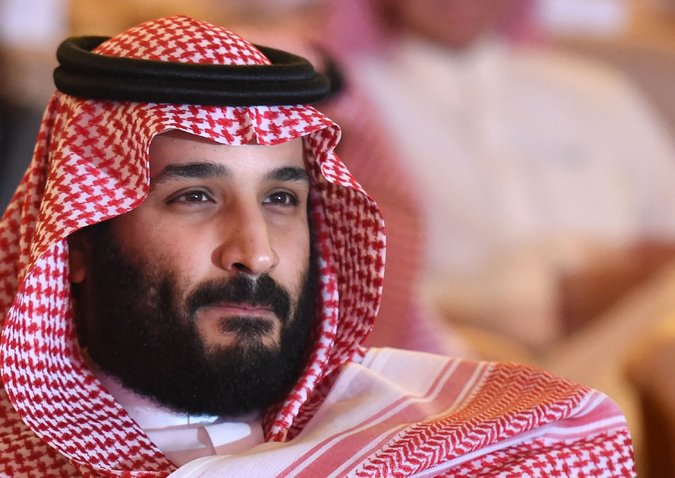
Crown Prince Mohammed bin Salman of Saudi Arabia. CreditFayez Nureldine/Agence France-Presse — Getty Images
Alas, who Saudi Arabia is also includes a large cohort of older, more rural, more traditional Saudis, and pulling them into the 21st century will be a challenge. But that’s in part why every senior bureaucrat is working crazy hours now. They know M.B.S. can call them on the phone at any of those hours to find out if something he wanted done is getting done. I told him his work habits reminded me of a line in the play “Hamilton,” when the chorus asks: Why does he always work like “he’s running out of time.”
“Because,” said M.B.S., ``I fear that the day I die I am going to die without accomplishing what I have in my mind. Life is too short and a lot of things can happen, and I am really keen to see it with my own eyes — and that is why I am in a hurry.”
الاحمر باختصار لمن لا يجيد اللغة الانجليزية:
- بعد 1979 دعمت العائلة السعودية الحركة الوهابية التي طبقت معايير متزمته من الاسلام.
- بعد هذه السنة تغييرت كثير من الامور الى الاسوء بسبب الابتعاد عن الاسلام الحقيقي المعتدل.
- الهدف هو اعادة المجتمع السعودي الى ما قبل 1979 والتخلص من هذا الفايروس (كما وصف في المقال) الذي اصاب المجتمع السعودي والهدف ايضا هو العودة والى وقت النبي محمد
- في ايام النبي محمد كان هنالك مسارح للموسيقى وكان هنالك اختلاط بين الرجال والنساء وكان هنالك احترام للمسيحيين واليهود في الجزيرة العربية وكانت هنالك امراة تعمل كقاضية تجارية في المدينة.
- اثناء اللقاء احد الوزراء جعل الصحفي يشاهد فيديو يوتيوب لنساء في السعودية في الخمسينات حيث يمشين بحرية مع الرجال وبدون غطاء راس ويلبسن التنانير يحرية.
- لقد قرر السماح للنساء بالذهاب للمسارح والملاعب
- سيتم تغيير المنهاج وارسال المدرسين الى فنلندا.
- بعد 1979 دعمت العائلة السعودية الحركة الوهابية التي طبقت معايير متزمته من الاسلام.
- بعد هذه السنة تغييرت كثير من الامور الى الاسوء بسبب الابتعاد عن الاسلام الحقيقي المعتدل.
- الهدف هو اعادة المجتمع السعودي الى ما قبل 1979 والتخلص من هذا الفايروس (كما وصف في المقال) الذي اصاب المجتمع السعودي والهدف ايضا هو العودة والى وقت النبي محمد
- في ايام النبي محمد كان هنالك مسارح للموسيقى وكان هنالك اختلاط بين الرجال والنساء وكان هنالك احترام للمسيحيين واليهود في الجزيرة العربية وكانت هنالك امراة تعمل كقاضية تجارية في المدينة.
- اثناء اللقاء احد الوزراء جعل الصحفي يشاهد فيديو يوتيوب لنساء في السعودية في الخمسينات حيث يمشين بحرية مع الرجال وبدون غطاء راس ويلبسن التنانير يحرية.
- لقد قرر السماح للنساء بالذهاب للمسارح والملاعب
- سيتم تغيير المنهاج وارسال المدرسين الى فنلندا.
